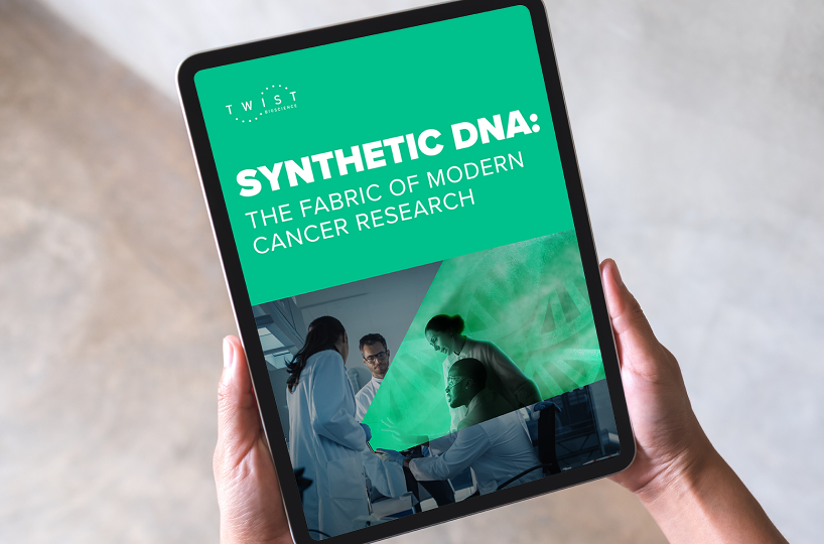
Download our Cancer Research
eBook
Learn how leading researchers are leveraging tools built on synthetic DNA to advance their research in cancer model development, drug discovery, diagnostics, and more.
The Cancer Research Continuum
Whether your goal is to uncover the genetic origins of cancer, engineer a biologic, or detect new biomarkers, you’ll need the proper tools for your research.
Discovery
There is still much needed to discover the fundamental mechanisms driving cancer—how do genetic mutations, cellular pathways, and environmental factors lead to tumor development?
By mapping these intricate biological processes, researchers can identify key oncogenes, tumor suppressors, and signaling networks that contribute to cancer progression.


Therapeutic Development
Cancer therapeutic development involves translating genetic insights into effective treatments, using engineered biological systems, animal testing, and targeted therapies.
To engineer cell and gene therapies, or to build antibodies, you’ll need to first code them in synthetic DNA. Learn more about the tools behind cutting edge therapeutics.
Detection
Detection and diagnostics research focuses on identifying cancer-related genetic mutations and biomarkers for early detection, monitoring, and personalized treatment.
Learn how liquid biopsies, NGS, and AI-driven analysis are enhancing sensitivity and accuracy.


Download our Cancer Research
eBook
Learn how leading researchers are leveraging tools built on synthetic DNA to advance their research in cancer model development, drug discovery, diagnostics, and more.
The Cancer Research Continuum
Whether your goal is to uncover the genetic origins of cancer, engineer a biologic, or detect new biomarkers, you’ll need the proper tools for your research.
Discovery
There is still much needed to discover the fundamental mechanisms driving cancer—how do genetic mutations, cellular pathways, and environmental factors lead to tumor development?
By mapping these intricate biological processes, researchers can identify key oncogenes, tumor suppressors, and signaling networks that contribute to cancer progression.


Therapeutic Development
Cancer therapeutic development involves translating genetic insights into effective treatments, using engineered biological systems, animal testing, and targeted therapies.
To engineer cell and gene therapies, or to build antibodies, you’ll need to first code them in synthetic DNA. Learn more about the tools behind cutting edge therapeutics.
Detection
Detection and diagnostics research focuses on identifying cancer-related genetic mutations and biomarkers for early detection, monitoring, and personalized treatment.
Learn how liquid biopsies, NGS, and AI-driven analysis are enhancing sensitivity and accuracy.

Key Methods for Cancer Research
Learn the fundamental techniques powering modern cancer research through Discovery, Therapeutic Development, and Detection.
Liquid biopsies are minimally invasive tests that detect cancer-related biomarkers in bodily fluids, enabling early detection, treatment monitoring, and personalized therapy.
Whole exome sequencing (WES) in cancer research identifies genetic variants in protein-coding and key disease-associated regions in the genome, helping uncover cancer drivers, guide targeted therapies, and advance precision medicine.
RNA sequencing (RNAseq) in cancer research analyzes gene expression patterns and transcriptomic alterations, providing insights into tumor biology, treatment response, and potential therapeutic targets.
CGP is an assay that utilizes next-generation sequencing (NGS) to assess multiple established biomarkers present within a solid tumor. CGP detects at a genomic resolution that allows identification of variant classes such as; SNVs, indels, CNVs, fusions, splice variants as well as cancer genomic signatures such as tumor mutational burden (TMB) and microsatellite instability (MSI). The breadth of this single assay allows for a robust understanding of a tumor profile alleviating the need to use multiple tumor specific panels or different modalities of testing.
Gain a holistic understanding of biological processes on a systems level. Synthetic DNA provides the uniform, accurate, raw material needed to power functional genomics.
PRODUCT OFFERING
PRODUCT OFFERING
Use synthetic DNA to create experimental systems that mimic the behavior of cancer in humans by encoding oncogenes. Alternatively, synthesize genes built to encode gRNA expression cassettes or knock-in templates to generate cell lines with pathogenic mutations.
PRODUCT OFFERING
NGS offers an understanding of cancer biology via comprehensive analysis of mutations, structural variations, and gene expression changes, providing critical insights for cancer classification, progression, and targeted therapy development.
PRODUCT OFFERING
Target ID and validation studies employ genomic, proteomic, and functional screening technologies to pinpoint and validate tumor-specific targets, ensuring they are biologically relevant, druggable, and capable of driving meaningful outcomes.
Advanced high-throughput screening techniques utilizing in vivo or in vitro workflows rapidly identify and validate potential therapeutic molecules that specifically target oncology and immuno-oncology related pathways.
PRODUCT OFFERING
Lead optimization involves refining biotherapeutic candidates to enhance their efficacy, safety, and pharmacological properties, utilizing in silico or engineering techniques such as humanization, affinity maturation, and developability assessments.
PRODUCT OFFERING
Focuses on further profiling and testing optimized antibodies to pick lead candidates including the use of anti-idiotype antibodies to detect specificity and efficacy, ensuring leads are primed for clinical trials by evaluating pharmacokinetics, safety, and potential efficacy against cancer targets.
PRODUCT OFFERING
We’re Here To Help
Every study is unique, and finding the right tools for the job can be tough. Don’t settle for an imperfect solution.
Our experts will help you find the best path forward and advance your studies.
Key Methods for Cancer Research
Learn the fundamental techniques powering modern cancer research through Discovery, Therapeutic Development, and Detection.
Liquid biopsies are minimally invasive tests that detect cancer-related biomarkers in bodily fluids, enabling early detection, treatment monitoring, and personalized therapy.
Whole exome sequencing (WES) in cancer research identifies genetic variants in protein-coding and key disease-associated regions in the genome, helping uncover cancer drivers, guide targeted therapies, and advance precision medicine.
RNA sequencing (RNAseq) in cancer research analyzes gene expression patterns and transcriptomic alterations, providing insights into tumor biology, treatment response, and potential therapeutic targets.
CGP is an assay that utilizes next-generation sequencing (NGS) to assess multiple established biomarkers present within a solid tumor. CGP detects at a genomic resolution that allows identification of variant classes such as; SNVs, indels, CNVs, fusions, splice variants as well as cancer genomic signatures such as tumor mutational burden (TMB) and microsatellite instability (MSI). The breadth of this single assay allows for a robust understanding of a tumor profile alleviating the need to use multiple tumor specific panels or different modalities of testing.
Gain a holistic understanding of biological processes on a systems level. Synthetic DNA provides the uniform, accurate, raw material needed to power functional genomics.
PRODUCT OFFERING
PRODUCT OFFERING
Use synthetic DNA to create experimental systems that mimic the behavior of cancer in humans by encoding oncogenes. Alternatively, synthesize genes built to encode gRNA expression cassettes or knock-in templates to generate cell lines with pathogenic mutations.
PRODUCT OFFERING
NGS offers an understanding of cancer biology via comprehensive analysis of mutations, structural variations, and gene expression changes, providing critical insights for cancer classification, progression, and targeted therapy development.
PRODUCT OFFERING
Target ID and validation studies employ genomic, proteomic, and functional screening technologies to pinpoint and validate tumor-specific targets, ensuring they are biologically relevant, druggable, and capable of driving meaningful outcomes.
Advanced high-throughput screening techniques utilizing in vivo or in vitro workflows rapidly identify and validate potential therapeutic molecules that specifically target oncology and immuno-oncology related pathways.
PRODUCT OFFERING
Lead optimization involves refining biotherapeutic candidates to enhance their efficacy, safety, and pharmacological properties, utilizing in silico or engineering techniques such as humanization, affinity maturation, and developability assessments.
PRODUCT OFFERING
Focuses on further profiling and testing optimized antibodies to pick lead candidates including the use of anti-idiotype antibodies to detect specificity and efficacy, ensuring leads are primed for clinical trials by evaluating pharmacokinetics, safety, and potential efficacy against cancer targets.
PRODUCT OFFERING
We’re Here To Help
Every study is unique, and finding the right tools for the job can be tough. Don’t settle for an imperfect solution.
Our experts will help you find the best path forward and advance your studies.
Featured Resources
Twist products are for research use only. The products presented here are not intended for the diagnosis, prevention, or treatment of a disease or condition. Twist Bioscience assumes no liability regarding use of the product for applications in which it is not intended. The results are specific to the institution to which they were obtained. The results presented are customer-specific and should not be interpreted as indicative of performance across all institutions.
Featured Resources
Twist products are for research use only. The products presented here are not intended for the diagnosis, prevention, or treatment of a disease or condition. Twist Bioscience assumes no liability regarding use of the product for applications in which it is not intended. The results are specific to the institution to which they were obtained. The results presented are customer-specific and should not be interpreted as indicative of performance across all institutions.











